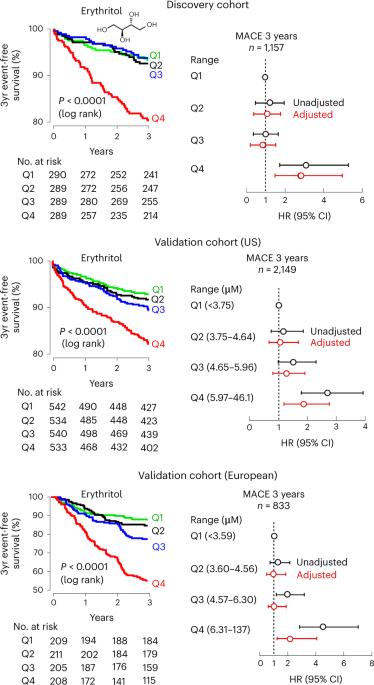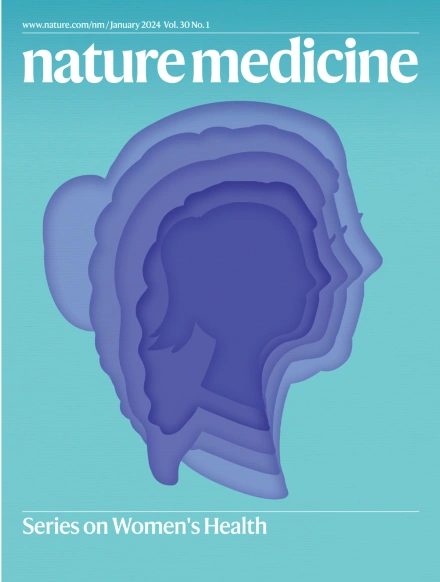人工甜味剂赤藓糖醇与心血管事件风险。
IF 58.7
1区 医学
Q1 BIOCHEMISTRY & MOLECULAR BIOLOGY
引用次数: 19
摘要
人工甜味剂是广泛使用的代糖,但人们对其对心脏代谢疾病风险的长期影响知之甚少。在这里,我们检查了常用的糖替代品赤藓糖醇和动脉粥样硬化血栓形成疾病的风险。在接受心脏风险评估的患者的初始非靶向代谢组学研究中(n = 1157;发现队列,NCT00590200),多种多元醇甜味剂,尤其是赤藓糖醇的循环水平与重大心血管不良事件(MACE;包括死亡或非致命性心肌梗死或中风)的发生(3年)风险相关。独立US(n = 2149,NCT00590200)和欧洲(n = 833,DRKS00020915)接受选择性心脏评估的稳定患者的验证队列证实了这种相关性(第四和第一个四分位数调整后的风险比(95%置信区间)分别为1.80(1.18-2.77)和2.21(1.20-4.07))。在生理水平上,赤藓糖醇增强了体外血小板反应性和体内血栓形成。最后,在一项前瞻性试点干预研究(NCT04731363)中,健康志愿者摄入赤藓糖醇(n = 8) 诱导标记和持续(>2 d) 在体外和体内研究中,血浆赤藓糖醇水平的增加远高于与血小板反应性和血栓形成潜力增加相关的阈值。我们的研究结果表明,赤藓糖醇与MACE事件风险相关,并促进血栓形成。评估赤藓糖醇长期安全性的研究是有必要的。本文章由计算机程序翻译,如有差异,请以英文原文为准。

The artificial sweetener erythritol and cardiovascular event risk
Artificial sweeteners are widely used sugar substitutes, but little is known about their long-term effects on cardiometabolic disease risks. Here we examined the commonly used sugar substitute erythritol and atherothrombotic disease risk. In initial untargeted metabolomics studies in patients undergoing cardiac risk assessment (n = 1,157; discovery cohort, NCT00590200 ), circulating levels of multiple polyol sweeteners, especially erythritol, were associated with incident (3 year) risk for major adverse cardiovascular events (MACE; includes death or nonfatal myocardial infarction or stroke). Subsequent targeted metabolomics analyses in independent US (n = 2,149, NCT00590200 ) and European (n = 833, DRKS00020915 ) validation cohorts of stable patients undergoing elective cardiac evaluation confirmed this association (fourth versus first quartile adjusted hazard ratio (95% confidence interval), 1.80 (1.18–2.77) and 2.21 (1.20–4.07), respectively). At physiological levels, erythritol enhanced platelet reactivity in vitro and thrombosis formation in vivo. Finally, in a prospective pilot intervention study ( NCT04731363 ), erythritol ingestion in healthy volunteers (n = 8) induced marked and sustained (>2 d) increases in plasma erythritol levels well above thresholds associated with heightened platelet reactivity and thrombosis potential in in vitro and in vivo studies. Our findings reveal that erythritol is both associated with incident MACE risk and fosters enhanced thrombosis. Studies assessing the long-term safety of erythritol are warranted. Metabolomics analyses reported an increased risk of cardiovascular disease associated with the artificial sweetener erythritol, supported by mechanistic studies showing that high levels of erythritol enhanced platelet reactivity and thrombosis formation.
求助全文
通过发布文献求助,成功后即可免费获取论文全文。
去求助
来源期刊

Nature Medicine
医学-生化与分子生物学
CiteScore
100.90
自引率
0.70%
发文量
525
审稿时长
1 months
期刊介绍:
Nature Medicine is a monthly journal publishing original peer-reviewed research in all areas of medicine. The publication focuses on originality, timeliness, interdisciplinary interest, and the impact on improving human health. In addition to research articles, Nature Medicine also publishes commissioned content such as News, Reviews, and Perspectives. This content aims to provide context for the latest advances in translational and clinical research, reaching a wide audience of M.D. and Ph.D. readers. All editorial decisions for the journal are made by a team of full-time professional editors.
Nature Medicine consider all types of clinical research, including:
-Case-reports and small case series
-Clinical trials, whether phase 1, 2, 3 or 4
-Observational studies
-Meta-analyses
-Biomarker studies
-Public and global health studies
Nature Medicine is also committed to facilitating communication between translational and clinical researchers. As such, we consider “hybrid” studies with preclinical and translational findings reported alongside data from clinical studies.
 求助内容:
求助内容: 应助结果提醒方式:
应助结果提醒方式:


